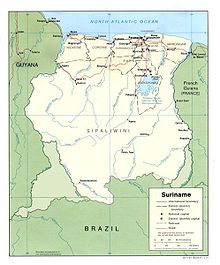Suriname
Suriname or Surinam is a country in South America. The official name of the country is Republiek Suriname (this is Dutch and translates to Republic of Suriname). It used to be known as Nederlands Guyana, Netherlands Guiana or Dutch Guiana. It is between Guyana and French Guiana. Paramaribo is the capital city, in which resides almost half of the country's population. About half a million people live in the country. Suriname became independent from the Netherlands in 1975. Before that, it was a part of the Kingdom of the Netherlands.
Republic of Suriname | |
|---|---|
| Motto: Justitia - Pietas - Fides damae - tentrem (in Latin) "Justice - Duty - Loyalty" | |
| Anthem: God zij met ons Suriname Gusti nunggil karo Suriname kita (in Dutch) ('God be with our Suriname') | |
 | |
| Capital and largest city | Paramaribo |
| Official languages | Dutch, English, Sranan Tongo (lingua franca) |
| Recognised regional languages | Akurio, Arawak-Lokono, Carib-Kari'nja, Sikiana-Kashuyana, Tiro-Tiriyó, Waiwai, Warao, Wayana |
| Other languages | Sarnami Hindustani, Ndyuka, Saramaccan, Matawai, Aluku, Paramaccan, Kwinti, Javanese, Chinese, French, Portuguese, Spanish |
| Demonym(s) | Surinamese |
| Government | Constitutional democracy |
| Chan Santokhi | |
| Ronnie Brunswijk | |
| Independence | |
• from Netherlands | 25 November 1975 |
| Area | |
• Total | 163,821 km2 (63,252 sq mi) (91st) |
• Water (%) | 1.1 |
| Population | |
• 2016 estimate | 558,368 (166th) |
• 2004 census | 492,829[1] |
• Density | 2.9/km2 (7.5/sq mi) (231st) |
| GDP (PPP) | 2009 estimate |
• Total | $4.510 billion[2] |
• Per capita | $8,642[2] |
| GDP (nominal) | 2009 estimate |
• Total | $2.962 billion[2] |
• Per capita | $5,675[2] |
| HDI (2012) | high · 76th |
| Currency | Surinamese dollar (SRD) |
| Time zone | UTC-3 (ART) |
• Summer (DST) | UTC-3 (not observed) |
| Driving side | left |
| Calling code | 597 |
| ISO 3166 code | SR |
| Internet TLD | .sr |

There are border disputes with French Guiana and Guyana all to the south of the country.
The industry of the country is centered on the mining and processing of bauxite. This makes up 15 percent of the Gross Domestic Product and more than 70% of the exports. Other exports are sugar, oil and gold. About 25% of the working people are employed in agriculture. The main trade partners are the Netherlands, the United States and countries in the Caribbean.
Dutch, French, Spanish and English explorers discovered the area in the early 16th century. A century later, sugar plantation colonies were established by the Dutch and English along the many rivers in the fertile Guyana plains. After the second Anglo-Dutch War England traded any claims to the territory for New Amsterdam which became New York.
In Suriname, people need to go to school until they are twelve years old,[4] and most of them do.[5] Literacy is very common, most people who are illiterate are women.[5]
Related pages
changeReferences
change- ↑ Algemeen Bureau voor de Statistiek in Suriname - Census profile at district level Archived 2012-01-30 at the Wayback Machine
- ↑ 2.0 2.1 2.2 2.3 "Suriname". International Monetary Fund. Retrieved 21 April 2010.
- ↑ "Human Development Report 2010" (PDF). United Nations. 2010. Archived from the original (PDF) on 21 November 2010. Retrieved 5 November 2010.
- ↑ United Nations High Commissioner for Refugees. "The UN Refugee Agency". Unhcr.org. Archived from the original on 10 May 2011. Retrieved 28 March 2010.
- ↑ 5.0 5.1 "United Nations Development Programme". Hdrstats.undp.org. Archived from the original on 18 August 2009. Retrieved 28 March 2010.

